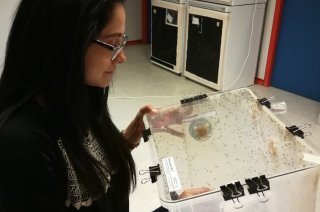
News
Heritability of Life History Trait
The rearing and storage improvement of biocontrol agents such as Bracon brevicornis is a necessary step for the efficiency of the control of insect pests. Having a better understanding of the heritability of diverse life history traits of these parasitoids can lead us to their artificial selection and the improvement of their mass rearing.
ESR update - The parasitic wasp B. brevicornis is a species of high interest, which has been widely used for the control of several pest insect larvae, e.g. the European Corn borer, Ostrinia nubilalis. These wasps, however, are very sensitive to inbreeding depression. Their sex determination system requires heterozygosity at the sex determining locus for successful female development. If inbreeding occurs, many female embryos will be homozygous, and therefore develop into diploid, infertile males. If a diploid male is chosen as a mate by a female, she will not be able to produce any daughters. Diploid male production may therefore quickly lead the population into an extinction vortex. In order to develop an alternative and efficacious mass rearing approach for these wasps, the heritability of several life history traits, starting with diploid male production and survival, will be investigated. Assessing the heritability of these traits leads us to know of the potential of these traits for artificial selection.
But how did we assess the heritability of the mortality in diploid males? For this, we took virgin females, which were given a host on which to lay eggs and produce sons (unmated wasps can only lay haploid males). They were then mated with their sons and given more hosts in order to produce offspring. Their daughters were collected upon emergence and with them, the same procedure as with their mothers was followed. The males produced by the mated females (mothers and daughters) were analyzed with flow cytometry to know their ploidy. I am currently working on the analysis of the parent-offspring heritability of this trait.
Other interesting traits I will work with are the longevity and the sex ratio of virgin and mated inbred females. Will these traits be heritable? I am looking forward to being able to tell you the answer…